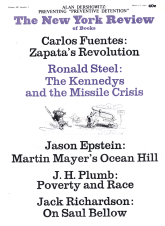In response to:
Beware of Melancholy from the November 7, 1968 issue
To the Editors:
I agreed with so much of what Conor Cruise O’Brien had to say about South Africa in the course of his review article in the November 7 issue that I am hesitant to write about a point of disagreement. But it seems so important for trustworthy interpreters of our current scene, and Mr. O’Brien is certainly one, to take great care in discussing matters of police brutality and the current tendency for oppressors, above all, to invoke “law and order” to disguise their perfidy. What I have in mind is the passage in which Mr. O’Brien writes that the behavior of the Johannesburg police “was a model of decency and restraint by comparison with the behavior of the Chicago police.”
Yes and no. It is true that the Chicago police assaulted the demonstrators in such fashion that it becomes fair to describe them as a “uniformed mob.” But it is also true that the Chicago police were “confronted” by a mass demonstration that was intent on exposing the brutality of “the system” to the eyes and ears of the world. The result was a shock to the conscience of many; the exposure was vivid, radicalizing, a dangerous portent of worse to come. And worse did come in the form of an election campaign in which all three candidates for the office of President took the side of the police.
But let us be clear. Confrontation is still possible in the United States. In South Africa what is called a demonstration is timid indeed: Silent, all-white, mainly conservative older ladies and clergymen solemnly marching carrying placards containing mild rebukes. And even such a modest affair—I attended a Black Sash demonstration in Johannesburg last February—is harassed by government photographers who take individual pictures of each demonstrator and “protected” by police who are in obvious league with apartheid hoodlums. These demonstrations, such as they are, are tolerated by the Government precisely because they are harmless events that create some slight illusion of a democratic society, helpful for apologists. The really tragic point is that it would be unthinkable for South African opponents of the regime to organize a demonstration that might “expose” the system. The reality of a police state such as exists in South Africa makes radical political leadership utterly untenable. A South African Tom Hayden, Rennie Davis, or David Dellinger would be locked up permanently for treason, probably after interludes of torture, and long before he was well enough known to have a following. The secret police of South Africa—the so-called Special Branch—has completely intimidated the white community. Protests are limited to marginal issues—the last inch of apartheid’s extension. To question the basic character of apartheid is itself to commit a serious crime of “disturbing race relations.”
My point is that Mr. O’Brien’s analogy between what happened in Chicago and what happens in Johannesburg encourages us to misunderstand both realities. The national settings remain decisively different, although there is force in the contention that the United States may be moving in South Africa’s direction. We must heed this warning, but also respect the distinction between the two societies.
Black people live in a thinly disguised concentration camp in South Africa. They are brutalized and intimidated systematically from the moment of their birth. The South African Government regards any meeting among Africans, even if completely non-political in nature, as illegal revolutionary activity. Under such circumstances, any effort at opposition becomes an underground one.
The American reality is more complex and far less rigidly determined. The ideals of racial equality continue to animate much of our national leadership. Black people have been humiliated and oppressed in our country, but the basic drift of the society continues to favor a solution that will enable dignity for all peoples. We live at a time when it is easy to abandon hope by making out a premature case of desperation. What we need now is a militant political movement in America that works within the framework of democracy to gain power on behalf of progressive values at home and abroad. We need to find a way to revive the spirit of hope that Senator McCarthy briefly brought to many of us.
Mr. O’Brien, precisely because he is so closely allied to this viewpoint, does us a disservice by blurring the distinction between the almost “closed” system of South Africa and the still quite “open” system in the United States. We, too, may become a police state, there are ominous tendencies visible, but it is one thing to live in a society that we know is a police state and quite another to live in a society that we fear may soon become a police state. In South Africa we know, in the United States although we fear we still are able to act on behalf of a better future.
Richard A. Falk
Center for Advanced Study
in the Behavioral Sciences
Stanford
Conor Cruise O’Brien replies:
I accept Mr. Falk’s correction. I did not intend to blur what I agree is a valid and important distinction “between the almost ‘closed’ system of South Africa and the still quite ‘open’ system of the United States.” I agree that my comparison between the Chicago and Johannesburg police might be misleading, and I am grateful to Mr. Falk for his clarification.
This Issue
March 13, 1969



